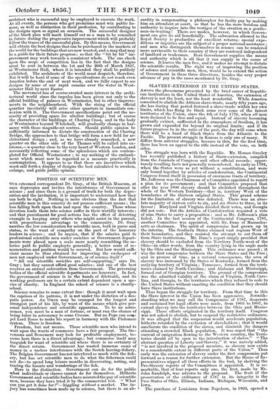POSITION OF SCIENTIFIC MEN.
Oun esteemed correspondent Dr. Gray, of the British Museum' at once deprecates and invites the interference of Government in science ; and since there is aground. of truth for both the depre
ca - tion and the invitation it s important to understand how they can both be right. Nothing i ing is more obvious than the fact that scientific men in this country do not possess sufficient means ; the loss falling both upon them and upon the country. Those whose devotion leads them into science suffer in their worldly interests ; and that punishment for good actions has the effect of deterring example in keeping away others who might assist in. the pursuit, with proportionate advantage to the community. Dr. Gray ascribes the low consideration for scientific men both in purse and status, to the want of sympathy on the part of the honorary leaders in science ; and he argues, that if the salaries paid to professional scientific men under societies or Government depart- ments were placed upon a scale more nearly resembling the sa- laries paid to public employes generally, a better scale of re- muneration and position would be secured. But how would suffi- cient means be thus obtained for improving the exchequer of men not employed under Government, or of science itself ? "All our scientific societies are self-supporting," says Dr. Gray ; but they cannot afford good salaries ; and one of the best receives an annual subvention from Government. The governing bodies of the official scientific departments are honorary. In fact, the government of science is in the hands of dilettanti, and its working professors are to a certain extent dependent upon a spe- cies of charity. In England the school of science is a charity- school.
Science remains to some extent free : though it must wait upon the caprices of its patrons, it is not under the dictation of a des- potic power. An Owen may be cramped for the longest and strongest part of his life, by want of the means which give per- sonal independence and scientific apparatus. To be an astro- nomer' you must be a man of fortune, or must run the chance of being tutor in astronomy to some Orcesus. But no Pope can com- pel Lord Rosse to make his report in harmony with the Ptolemaic system. There is freedom.
Freedom, but not means. Those scientific men who intend to wait upon the wants of commerce have a fair prospect. The Ste- vensons and Bessemer; may look for profitable employment, be- cause here there is a direct advantage ; but commerce itself may languish for want of scientific aid where there is no certainty of the direct return. Government has wasted immense sums of money in a useless interference with the Scotch herring-fishery. The Belgian Government has not interfered so much with the fish- ery, but has set scientific men to do what the fishermen could not do—to spend long leisure months in discovering, noting, and tracing the haunts and wanderings of the fish.
Here is the distinction. Government can do for the public what individuals or classes cannot do for themselves. Hitherto Government and scientific bodies have misratedthe pay of scientific men, because they have tried it by the commercial test. "What can you get it done for ?"—higgling without a market. The in- jury has sometimes been made up to science, but there is an ab- surdity in compensating a philosopher for faulty pay by making him an attendant at court, so that he has the more freedom and authority to inquire into the vestiges of the creation as a gentle- man-in-waiting ! There are modes, however, in which Govern- ment can give its aid beneficially. The subvention allowed to the Royal Society is productive of excellent returns; special expe- ditions or inquiries are the subject of a proper national assistance ; and men who distinguish themselves in science can be rendered more serviceable to their country if they are rendered independent of landlord or tradesman. Here Government supplies the means and authority which is all that it can supply in the canoe of science. It leaves the men free, and it makes no attempt to dictate the scientific results. The right way of improving the position of science and scientific men, then, would be to extend the notion of Government in these three directions, besides the very proper advance of pay in the cases mentioned by Dr. Gray.


































 Previous page
Previous page